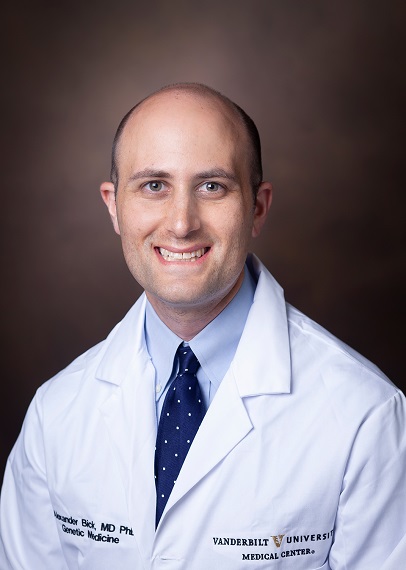
Michael Topf, MD
- Assistant Professor of Otolaryngology
Michael Topf, MD
- Assistant Professor of Otolaryngology
michael.topf@vumc.org
Research Program

Alexander Bick, PhD, MD
- Associate Professor of Medicine
- Director, Division of Genetic Medicine
Alexander Bick, PhD, MD
- Associate Professor of Medicine
- Director, Division of Genetic Medicine
alexander.bick@vumc.org
Research Program

Cristina Kline-Quiroz, D.O.
- Assistant Professor
Cristina Kline-Quiroz, D.O.
- Assistant Professor
cristina.kline-quiroz@vumc.org
Research Program
Research Description

Venkataswarup Tiriveedhi, MD, PhD
- Associate Professor
- Director, Human Anatomy and Physiology
- Director, Tumor Immunology Laboratory
- Adjunct Professor, Vanderbilt University
Phone
3500 John A Merritt Blvd
Nashville, TN 37209
Nashville, TN 37209
Venkataswarup Tiriveedhi, MD, PhD
- Associate Professor
- Director, Human Anatomy and Physiology
- Director, Tumor Immunology Laboratory
- Adjunct Professor, Vanderbilt University
615-963-5779
venkataswarup.tiriveedhi@vanderbilt.edu
3500 John A Merritt Blvd
Nashville, TN 37209
Nashville, TN 37209
Research Program

Cosmas Okoro, PhD
- Professor of Organic Chemistry
Phone
Department of Chemistry, Tennessee State University
3500 John A. Merritt Blvd.
Nashville, TN 37209-1561
3500 John A. Merritt Blvd.
Nashville, TN 37209-1561
Cosmas Okoro, PhD
- Professor of Organic Chemistry
615-963-5332
cokoro@tnstate.edu
Department of Chemistry, Tennessee State University
3500 John A. Merritt Blvd.
Nashville, TN 37209-1561
3500 John A. Merritt Blvd.
Nashville, TN 37209-1561
Research Program

Deepa Magge, M.D.
- Assistant Professor in Surgery
- Division of Surgical Oncology and Endocrine Surgery
Deepa Magge, M.D.
- Assistant Professor in Surgery
- Division of Surgical Oncology and Endocrine Surgery
615-322-2391
deepa.r.magge@vumc.org
Research Program
Study tracks genomics of lung tumor behavior
A study by Vanderbilt researchers has identified genomic alterations in early stage adenocarcinomas of the lung that may indicate whether the lesions develop into aggressive tumors.
Study finds AI can categorize cancer risk of lung nodules
Computed tomography scans for people at risk for lung cancer lead to earlier diagnoses and improve survival rates, but they can also lead to overtreatment when suspicious nodules turn out to be benign.


